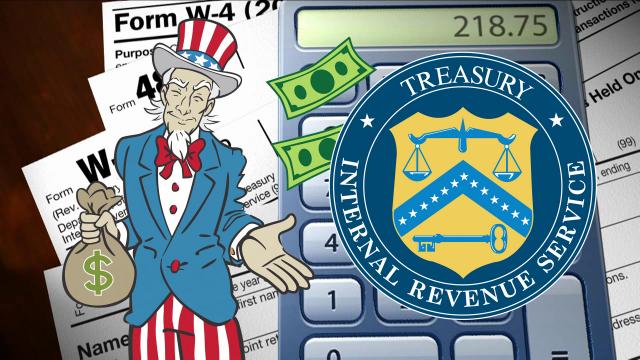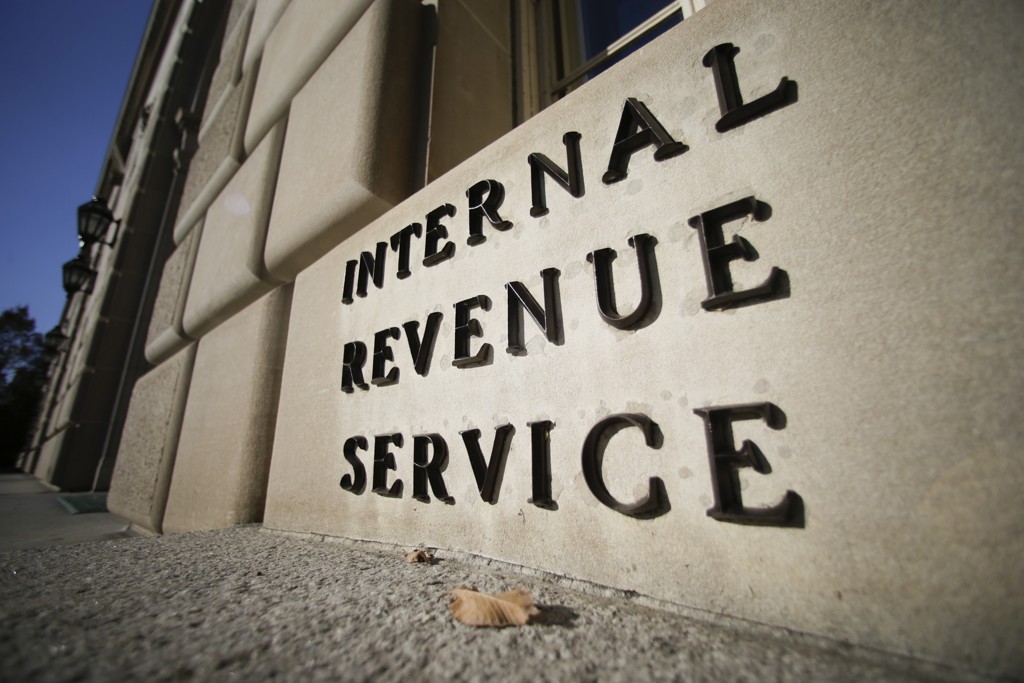
BERLIN—Until she divulged her husband’s financial records to the IRS three years ago, Genette Eysselinck was a proud American, born on an Army base in North Carolina, and living in a small city in southern France.
Then, Eysselinck, 66, was trying to comply with U.S. tax law requiring her to provide bank account numbers and balances for her and her spouse – a Belgian citizen – who lay in the hospital recovering from vascular surgery. Once her husband discovered what she had done, he was incensed.
“He felt that I had robbed him of his privacy,” she recalled. “He said he had no reason to give them that information. He is not an American, he’s never lived in America and nowhere in our marriage contract from 1981 did it say that he had to give that information to marry me. So he was not very happy with my giving it over.”
Ultimately, Eysselinck decided there was only one way to save her marriage – by renouncing her U.S. citizenship. She did so on February 6, 2012.
"I’ve become more and more depressed,” she said of her feelings since surrendering her passport. "I went ahead and in a panic decided to renounce my citizenship simply because I had upset my husband so much and he was so ill at the time.
“I hope someone, somewhere, sometime will say that this is wrong. You can’t just paint all Americans abroad with the same paintbrush as being tax frauds because we’re not."
Eysselinck is one of hundreds of Americans living overseas who are being hounded by the IRS since it began cracking down on tax evasion three years ago. Stories that used to be few and far between are now a constant concern for organizations like American Citizens Abroad and the Federation of American Women’s Clubs Overseas.
And it is a problem that will likely worsen as the U.S. Treasury Department moves to construct an automatic exchange of taxpayer information between governments. The effort is mired in questions about the role of banks in policing government policies, the state of data privacy protections for citizens and the limits of American power.
“In some cases, the banks have broadened the scope and said it’s not just U.S. citizens,” said Victoria Ferauge, a member of American Citizens Abroad who lives just outside Paris with her husband and two daughters. “It’s just about anybody with a U.S. connection.”
That means green card holders, those born in the U.S. but who have never lived there, and people married to Americans.
Ferauge said she was recently introduced to an "accidental" American whose family moved abroad in the 1930s when she was three -- and when she would normally have lost her citizenship for having moved.
“All these years she believed she was no longer an American citizen,” said Ferauge. “Now her bank believes she may fall under the category of U.S. ‘persons’ who they are required to report to the IRS. She has a 98-year-old mother, whose accounts she manages and she’s terrified that she’s going to get shut out of them.”
This painful mess ensnaring an increasing number of ordinary people is the result of the U.S. government’s response to a dispute with the world's largest private bank, Switzerland's UBS.
In a 2009 settlement with the U.S. Justice Department, UBS conceded it had assisted American citizens for nearly a decade in evading taxes by concealing their ownership of bank accounts abroad. The bank agreed to end its American offshore operations and paid a huge fine: $780 million.
Since then, the Treasury department has begun enforcing the Report Foreign Banks and Financial Accounts (FBAR) regulations, and Congress passed new legislation in 2010 called the Foreign Account Tax Compliance Act (FATCA).
FBAR has existed since the 1970s but only recently has the federal government started enforcing it against small account holders. The tax form requires U.S. citizens to declare foreign accounts in which they have a financial interest, or accounts for which they have signature authority, if the combined value of those accounts exceeds $10,000 at any time during a calendar year.
But after years of slack tax administration abroad, there is a lot of confusion about who and what needs to be filed on FBAR, and the consequences for a failure to understand and comply can be ruinous.
Marvin Van Horn, a 64-year-old U.S. citizen and permanent resident of New Zealand, realized he had not been compliant with FBAR after listening to a program on National Public Radio during a trip to the U.S. in 2009. He and his wife, an Australian national, own a house in New Zealand but have no major bank accounts there. They weren’t sure the requirements applied to them but decided to participate in an amnesty program the IRS was offering.
As he went through the process, Van Horn tried to calculate his penalty for failing to file FBAR. "I figured, 'Oh my God, it's going to cost around $90,000,'" he said. "I am not rich, and that's not chicken feed anymore. That eats up retirement savings. It hurts."
Worse, when the IRS examiner reviewed his voluntary disclosure file, he says, she wanted to know if he'd ever rented out his house when he wasn't there. Because the answer was yes, she told him, his house would go into the penalty calculation. Van Horn was incredulous.
"I said, 'You want to apply the penalty based on my house?' So then my penalty went from $90,000 to $172,000. I said, 'This is ridiculous. For a tax failure that's less than $20,000 over six years and a failure to file a form, you want to charge me a penalty of $172,000?'"
In the end, Van Horn says he settled for something – $25,000 – he probably should not have paid. But it was in the context of the time and the hardline position the IRS was taking. It was a "relief decision," he says, anchored by the draconian $172K penalty he was staring in the face.
In case any U.S. citizens should decide not to voluntarily declare their bank accounts to the IRS, FATCA requires foreign financial institutions to do it for them. Under the new law, banks must report assets held by U.S. persons to the IRS through a new system of automatic information exchange. No suspicion of tax fraud is necessary. FATCA is scheduled to take effect July 1, 2014.
Beyond the anxiety of looming personal financial disaster threatened by the IRS, expats are also feeling some resistance to the methods by which the U.S. government is persuading foreign financial institutions into providing bank information to the American tax authorities: the FATCA requirements for banks have already resulted in Americans’ bank accounts being closed down; U.S. expatriates being denied lines of credit and loans including mortgages; second thoughts over hiring Americans for top positions that involve signature authority over company accounts; as well as millions of dollars in fines and expenses for individuals and businesses trying to become compliant.
“We feel a little like David against Goliath here,” said Ferauge. “It’s not that I think some sort of information exchange is a bad idea – I believe that it’s coming like it or not – but there are no safeguards here. There are too many unintended consequences. It’s negatively impacting people who are not tax evaders. What I find astonishing is how it never occurred to the IRS how this could have an impact on regular people.”
The government’s motivation to close tax loopholes is well founded. In addition to the UBS scandal, Apple CEO Tim Cook recently assured the Senate that Apple pays every single dollar of taxes it owes but, nevertheless, managed to sidestep billions in taxes through subsidiary companies on other continents.
Today, that tactic is used by hundreds of other corporations – some of which directly imitated Apple’s methods, say accountants at those companies, according to reports from the New York Times.
Most Americans agree there is a problem with taxation in the country. An ABC News/ Washington Post poll conducted in April showed that 56 percent of Americans view the federal tax system unfavorably. And part of the problem is with offshore bank accounts. But is FATCA, and the multilateral automatic information exchange that goes with it, the right solution?
“In my view, a working system to address offshore accounts addresses offshore accounts,” said Itai Grinberg, professor of law at Georgetown University. “For a U.S. expat living in Berlin, having an account in a Berlin bank is not an offshore account. It’s an on shore account.”
“That’s my view, that’s not what FATCA says,” he added.
Grinberg worked in the Office of International Tax Counsel at the Department of Treasury while FATCA was being drafted and has written about it as part of an evolutionary moment for the international tax system.
According to Grinberg, the distinction between offshore and onshore bank accounts hasn’t been made in FATCA because the U.S. taxes citizens regardless of where they reside. Many Americans don’t know that they are subject to tax by Uncle Sam despite the fact that they left home long ago. Most tax systems are based on residency not citizenship.
“We’re the only major economy on earth that has that rule,” said Grinberg.
In addition to the complications that citizen-based taxation creates for FATCA, it’s unclear if the law includes adequate protections for the distribution of personal financial information. Grinberg says those protections are still being sorted out.
This would seem important given the recent news that the U.S. culls and shares information on its citizens in secret through the NSA's PRISM program.
Charges from the former U.S. government contractor Edward Snowden that, despite their public posturing, the German intelligence service is ‘in bed’ with the National Security Agency have shed a new light on the liberties the United States is willing to take have added to growing public concern.
Snowden leaked information last week about a ‘don’t ask, don’t tell’ intelligence swapping arrangement the U.S. has with its allies.
As the U.S. Treasury moves to implement FATCA by July, it has begun negotiating intergovernmental agreements promising reciprocity from U.S. banks holding foreign assets. These agreements were not part of the legislation passed by Congress, but without them the law is essentially unenforceable.
“The easiest way to think about the intergovernmental agreements (IGAs) is to start with the legal problems that financial institutions outside the U.S. were facing with FATCA,” said Keith Lawson, a senior tax attorney at the Investment Company Institute and chair of the Business Advisory Group to the Organization for Economic Co-operation and Development (OECD).
“The IGAs were put into place to help, for example, UK banks to satisfy their U.S. FATCA obligations without violating home country laws. The reason that reciprocity is not necessarily problematic begins with the five countries that started discussions with the U.S.; these are countries that treat taxpayer information with a high degree of confidentiality," said Lawson. "The U.S. doesn’t have any particular concerns that, say, the German ministry of finance is somehow going to disclose information about German investors in the U.S.”
Currently there are 19 countries in the process of setting up a multilateral automatic exchange of information regime. Lawson said the UK, France, Italy, Germany and Spain announced in April that they were working together on a FATCA IGA between those countries. Since then, 14 other countries including Mexico have expressed an interest in joining that initiative.
“Assuming that initiative comes somehow to fruition there at some point will be quite a bit of tax information being shared between countries on a more automatic basis than it is today," Lawson said. “A lot of those countries already have agreements to share information but the mechanism to share that information is not as well developed as it would be under the intergovernmental approach.”
The data sharing arrangement is causing concern already – Germany has the strictest data protection regime in Europe.
Peter Schaar, the federal commissioner for data protection and freedom of information in Germany, criticizes FATCA for being personally intrusive at best and dangerous for society at worst.
“All in all, a fairly complex system – so complex that in some cases smaller banks often cancel their decades long business relationships with Americans living in Germany, denying them money and investments. This is rightly perceived by the affected Americans as discriminatory," he wrote on his official blog.
The European Data Protection Supervisor, Peter Hustinx, recently raised concern over major deficiencies it found in these anti-money laundering proposals. “Specific safeguards, such as the right of individuals to be informed and the respect of the principles of proportionality and purpose of limitation are essential to prevent ordinary citizens from being excessively profiled by service providers on dubious grounds with potentially damaging effects,” he said in a statement.
Such safeguards would welcome to Eysselinck and other Americans abroad that are among the first affected by these dictates.
“My husband has a daughter from his first marriage,” Eysselinck said. “He became very uncomfortable that the American government was going to impinge on his inheritance to his children and grandchildren who are Italian citizens and have never been American.”
“He said to me, ‘maybe you have an unwavering faith in the honesty of all of those people who work in the IRS, but I don’t,’” she added.
Meanwhile, there is a growing backlash against FATCA.
Congressman Bill Posey R-FL, has called for a moratorium on FATCA, contending that the effort would not only be bad for individuals but for the country as a whole. In a letter to Secretary Lew, he argued that FATCA would not bring a significant amount of money into the U.S. Treasury, but instead discourage investment in the United States.
“Basically we’re concerned that there has been no study of the economic impact of these regulations,” said Posey’s spokesperson George Cecala. “There is a real possibility that a lot of banks in our state could be destabilized because they have a large percentage of non-resident alien deposits that hold up their institutions and if you have a run on those deposits, those banks could collapse. Who’s going to bail that out?”
“You have to watch the balance here because you do have large banks that do benefit from smaller banks collapsing because then they can go in and buy up their business,” he added.
The law’s privacy provisions have also been questioned. Senator Rand Paul, R-KY, has introduced a bill to repeal the provisions of FATCA that he says undermine the privacy of U.S. citizens. “The intent of this law was to prevent tax evasion by increasing access to overseas bank accounts held by U.S. citizens,” Paul said in a letter to his Senate colleagues.
“However, any law enforcement benefits have been vastly outweighed by the deleterious effects of FATCA on economic growth and the financial privacy of Americans,” he wrote.
And across the political isle, Representative Carolyn B. Maloney, D-NY, is concerned about the absence of representation for the interests of ex-pat Americans in Congress.
“It's not always easy being an ex-pat American working overseas, yet still voting and paying taxes and maintaining ties here at home,” she said in an email. “That's why I've long been an advocate for overseas Americans and why I've reintroduced my bill establishing a federal commission to examine how U.S. laws, policies, and bureaucracy affect this hidden constituency.”
Maloney argues that whether or not ex-pats work for American businesses overseas, they help increase exports of American goods and services because they traditionally buy American goods, sell American goods, and create business opportunities for U.S. companies and workers. She says their role in strengthening the U.S. economy, creating jobs in the United States, and extending American influence around the globe is vital to the well being of our nation.
“We're up to 16 co-sponsors from all parts of the country, so there's momentum behind the ‘Commission on Americans Living Abroad Act’ and I'm optimistic about its prospects,” said Maloney.
While there’s little indication FATCA will be repealed, the many unresolved questions about its inadvertent effects and insufficient privacy protections provide for a long road ahead.
“Of course there will be hiccups,” said Itai Grinberg of Georgetown Law. “Try to build a global system it takes a long time and it’s not easy. I suspect that over the next five to 10 years we will build it.”
For Americans currently overseas, this means living under universal suspicion without individual evidence until a better system can be worked out.
“Americans should care that their fellow Americans who live abroad and are proud of their country and love their country but don’t necessarily feel the need to live within its borders don’t have the rights and privileges guaranteed by the American constitution," said Eysselinck. “We should be considered innocent until proven guilty. The current situation is that Americans are considered guilty simply by virtue of the fact that they do not live on the American continent and this is profoundly wrong.”
3 WAYS TO SHOW YOUR SUPPORT
- Log in to post comments


















Comments
Adic Loans replied on
Finance:
Hello,
Our company operates a dynamic, online system which is comprised of over 42 million subscribers. This online technology that we use gives us the ability to our people out there a best, preferred choice when they are looking for loans or any other financial assistance.
Have you thought of getting a legitimate loan provider where you would like to reinvest after much dividends? Note that we are offering out loan at low interest rate of 2% per year or Monthly depending on which you prefer, However, We offer a wide variety of financial services to individuals and businesses owners. We work with individuals, small, medium, and large-scale businesses to help them either get started or expand into new territories. We help fund small businesses when needed most to expand existing business, buy capital equipment, pay expenses and for many other needs such as advertising, rent, renovation etc. Email: adicloancompany@gmail.com for more informations.
Thanks
Best regards,
Mr Brown William.
Email: (adicloancompany@gmail.com)
Systems Network, MaryLand
UNITED STATE OF AMERICA.